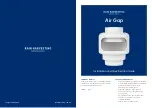
16
AZ-SD, AZF-G/BT43
4.1 Thread chain holding pressure
4.2 Knife change
Fig. 4-1
Fig. 4-2
increase
decrease
③
kinfe
②
4.
Adjustments
To adjust the thread chain holding pressure,
turn the nut ① . When the pressure is too low or
too high, adjust the pressure.
● To increase the pressure, turn the nut ①
clockwise.
● To decrease the pressure, turn the nut ①
counterclockwise.
If the pressure is too high, a thread chain can
be cut before the thread chain presser holds it
or a material can be entangled.
If the pressure is too low, a thread chain comes
out of the thread chain holder too early and it
is impossible to sew the thread chain into a
seam beautifully.
(1) Turn the thread chain presser plate ② in the
arrow direction with raising it slightly.
(See Fig.4-2)
(2) Loosen the screw ③ .
If the knife does not move at this moment,
tap the part ④ lightly with something like a
screwdriver.
(3) Change the knife. Regarding the direction
and position of a knife, see Fig.4-2.
(4)
Tighten the screw ③ securely and fasten a new
knife.
(5) Fit the pin hole and the slot for the knife of
the thread chain presser plate ② on the pin and
the knife respectively and return the thread chain
presser plate ② to the original
position.
alignment on
the left end
note the direction
of knife
Before adjusting, ALWAYS turn the motor switch OFF
and check that the motor has already stopped.
When removing the knife, be careful not to be cut hands
by the knife.
ÃÁÕÔÉÏÎ
④
①





































